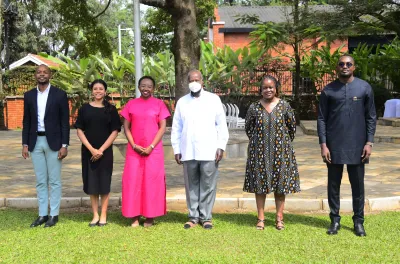
The leaders of the ruling party have told Ugandans on their faces how they no longer care about public interest, hence Stella Nyanzi and her many disciples!
The National Resistance Movement (NRM) may claim that it is in charge of the affairs of this country. Its chairman is the President; it controls the overwhelming majority of Parliament and Local Governments, and claims the largest following across the country.
However, I am inclined to think that the NRM is steadily losing its grip on Uganda. What else explains recent events?
Statistics show that Uganda is the 4th most religious country on earth, with 95% of its citizens considering religion as very important in their lives. Although Uganda has a history of political turmoil, it has evaded full-blown social upheavals. Ugandans were a morally sensitive populace that held family values and community responsibility dear to their hearts and actions.
Ugandans have always been poor. Since the earth was created, Uganda has never been richer, healthier, safer, and with better economic prospects. Ugandans have lived appalling standards of living. Ugandans have seen ruthless dictators and manipulators.
Yet despite all these, the people of this country have kept the rules of decency and civility dear. They refused to allow adversity to force them to abandon their cultural values and morals. Not anymore.
Defiance vs. deviance
At the turn of this millennium, a team of sociologists led by Charles McCaghy, a Professor of Criminology, published a book entitled: “Deviant Behaviour: Crime, Conflict and Interest Groups.” For starters, deviance refers to the state of diverging from usual or accepted standards, especially in social behaviour. In short, deviance is any behaviour that violates cultural norms.
Deviance can be formal – if someone violates formally enacted laws; in which case it turns into a crime. It can also be informal, involving violation of social norms that have not been codified into law.
The abovementioned book summarises the theories advanced by sociologists to explain the reasons behind deviance. Some attributed it to psychological factors; that some people have differences in their brain structure which are likely to contribute to their deviant behaviour.
Other researchers attribute it to social-strain; that a person may choose deviance to attain his or her goals through rejection of cultural norms and the traditional way of abiding by them. Some may even extend it to ‘rebellion’ by attempting to replace both the cultural norms and the traditional means of achieving them with different norms and means.
Some attribute deviance to conflict over power and resource imbalances in society. The obvious example here is that individuals may engage in deviant or criminal behaviour because they lack the resources necessary to survive.
Things gone wrong
To mitigate deviance, society puts in place institutions. Economists today agree that perhaps more than anything else, what makes some countries more prosperous than others is the quality of the country’s institutions. Douglass North defines institutions as “the rules of the game in a society or, more formally, are the humanly devised constraints that shape human interaction.”
Howard Becker, an American sociologist, posit that a ‘normal person’ is able to control his deviant impulses by thinking about what will happen if he/she carries them out. In other words, he/she does not want to risk damaging his/her image as a normal person.
Becker gave the example of slum-dwellers that, thanks to the callous conditions they are born and grow in, tend to develop unprecedented frustration. He argued that such people, because of failure to meet their needs, become frustrated and vent their frustration in deviance. What is happening in Uganda calls for a review of some of these theories.
Today, many right-thinking citizens of this country hold a view that some things that were hitherto considered as deviant acts have since become normal acts. I am not a moral judge to evaluate people’s behaviour, but basing on the traditional African cultural norms, I can tell that something has gone badly wrong.
Indiscipline everywhere
Mr President, I rarely involve this space in tittle-tattle issues. However, I felt it would be my utmost disservice to this country if chose to keep quiet about the events in this country lately.
Every day that passes I cannot help wondering: what type of country are we becoming? When I say this, someone may easily think that my mind is on the now (in)famous Stella Nyanzi. Well, yes. But only partly.
I wrote in these pages about this subject, some six years ago. Then, very senior leaders of NRM were grabbing wives of their voters. The President was calling his political opponents names. Leaders were stealing all sorts of things ranging from underpants, to money meant to help the sick. Others were stealing money meant to immunise children, while their colleagues were stealing relief items meant for disaster stricken people.
As a result, and as expected, the people came to perceive not only corruption but also outright theft as normal. People started abusing those who didn’t steal public resources as being “stupid” or non-enterprising. Corruption suspects and convicts started behaving like celebrities.
Mr President, I have written about this before. I queried the indiscipline among the leaders and the wananchi. I warned you that you might never transform an undisciplined society.
Leaders became unaccountable both politically and morally. Although I am disappointed, I am not shocked that many people (including very educated and well-meaning individuals) have chosen to associate with Nyanzi’s message, in spite of the language! That is why I picked this pen.
The insensitivity
Mr President, you have bred a lot of political frustration in this country. Very decent people are sending solidarity whispers to Nyanzi. It is amazing how Ugandans; highly educated or otherwise, affluent or otherwise, old or young, men or women, have chosen directly or inconspicuously to associate with a person who by all standards has violated the informal norms of our society.
In traditional Africa sane people, particularly women, did not speak obscenities in public, let alone abusing elders in front of children. In Buganda, Nyanzi’s tribe, our ancestors crafted a parlance they would use if they wanted to speak ‘dirty’. Vulgar was preserved for functions typically performed after the ‘world had gone to sleep’ or in secluded places.
Globally, members of the “specialised class” of the society do not behave in a manner that would put their person in disrepute. If they did, their actions would be condemned by their fellows no matter the support they enjoyed from the “bewildered herd”.
So, why has Nyanzi been treated differently, by nearly all strata of people? I think it is all on account of the insensitivity with which, you Mr. President, and a number of other NRM leaders are lately addressing Ugandans and their concerns.
The other day, I heard you saying, “I am not your servant. I am just a freedom fighter; I am fighting for myself, for my beliefs…” Of course, we all know that politicians are into politics to serve themselves, but why say it to our faces? That insensitivity it is what is boiling in people’s heads.
Nearly every single Ugandan who owns a smartphone has a video clip where you said, “I am not working for other people; I am working for myself, my grandchildren [and] my children.” This is not a statement that people expected to come from a head of state, however much it may be true and honest.
Frustrations everywhere
May be because of this stance, even the lower cadres of NRM have become very insensitive and arrogant. Yet wise people had advised thus, “In a state where the government cannot control the people by force, it had better control what they think,” said Walter Lippmann.
Noam Chomsky, one of the living philosophers of public communication, wrote, “Propaganda is to democracy what violence is to totalitarianism.” In Uganda, the would-be state propagandists are the lead abusers of the public.
Mr. President, philosophers have always advised that no might can protect itself from the trampling and rage of a ‘bewildered herd’. Being a cattle keeper, you know quite well what happens when a herd gets excited. A single cow may start running and others follow. When it kicks its hind limbs, the rest will do the same. They don’t ask why they are running or kicking. Often the steward loses control of such a herd, and if he attempts to stop the animals, they may trample him to death.
Historically, leaders have controlled public opinion to tame the bewilderment of the masses. In his farewell address, America’s first president, George Washington remarked, “As the structure of a government gives force to public opinion, it is essential that public opinion be enlightened.” Lippmann later, in 1922, suggested the “manufacture of consent” as the best way to manage public opinion.
As you know, Mr. President, issues of public opinion rest on the shoulders of public interest. Does NRM, anymore, care about public interest? You said yourself that you no longer care, or even serve the public interest. Why then can’t you understand that you are better-off leaving Stella Nyanzi and her many disciples to shout out their frustration in obscenities?
Of course I can guess why. You are not what are saying you are. You are a good man and servant of people. You simply got frustrated when you learned that the very people whom you sacrificed a lot to liberate no longer loved you the way they once adored you.














Ramathan Ggoobi
Ramathan Ggoobi is Policy Analyst, and Researcher. He lecturers economics at Makerere University Business School (MUBS) and has co-authored several studies on Uganda's economy. For the past ten years, he has published a weekly column 'Are You Listening Mr. President' in The Sunrise Newspaper, Uganda's Leading Weekly
Leave a Comment
Your email address will not be published.